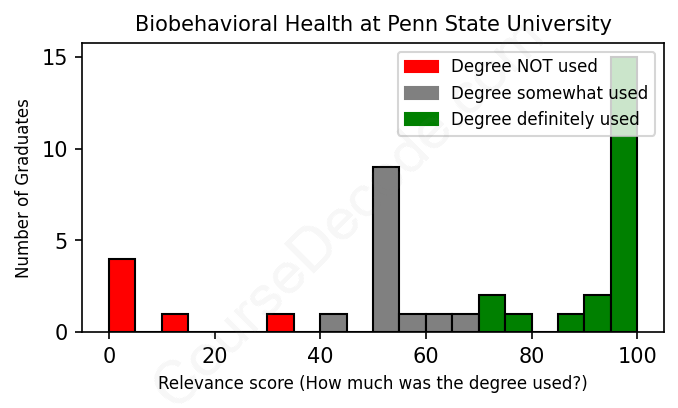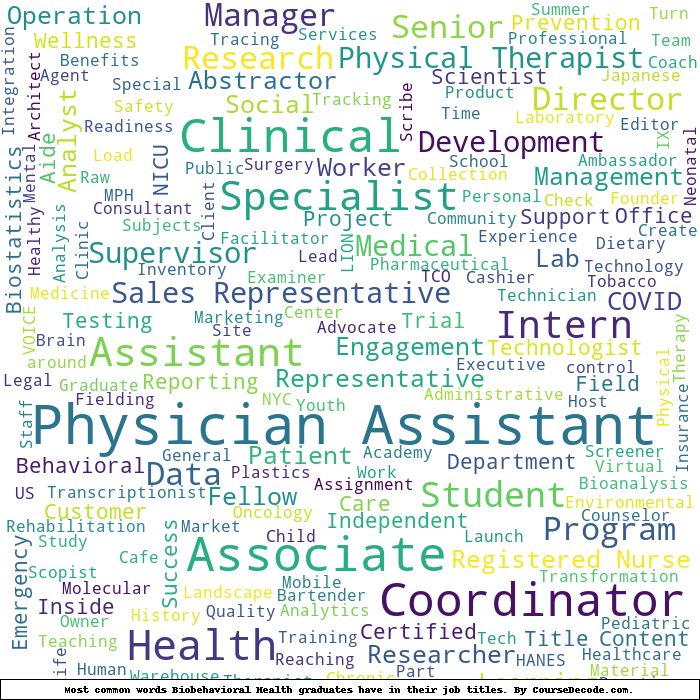
First, some facts. Of the Biobehavioral Health graduates from Penn State University we've analyzed , here's how many have used (or NOT used) their degree in their career:

These are estimates based on AI analysis of 40 LinkedIn profiles (see below).
The verdict? On par with the average. Overall, with an average relevance score of 67%, Biobehavioral Health graduates from Penn State University have about the same likelihood of finding work in this field as the average graduate across all fields:
And for comparison, here's the chart for all profiles we've looked at across all degrees.
Also, after graduating, 55% of these graduates have pursued further education other than another Bachelor's degree (such as a Masters degree or other), compared to the average across all profiles of 35%. This suggests you may need more than just a Bachelors degree to be competitive as a Biobehavioral Health graduate.
See the details:
|
Relevance score: 43% We think this person has gone into a career only somewhat relevant to their degree. We think this person has gone into a career only somewhat relevant to their degree.
DEGREE INFOGraduated in 2020 from Penn State University with a Bachelor of Science - BS in Biobehavioral Health. No other secondary education since. JOB HISTORY SINCE GRADUATIONPart-Time Development Specialist Penn State University Jan 2020 - May 2020 Inside Sales Representative  Medical Guardian Nov 2020 - May 2021 Engagement Specialist  Syneos Health May 2021 - Jul 2022 Senior Engagement Specialist  Syneos Health Jul 2022 - Aug 2023 Engagement Team Lead  Syneos Health Aug 2023 - Present ABOUTNo information provided. |
The top 10 most common jobs done by the graduates we've analyzed (ranked most common to least) are:
So, let's break down the types of jobs that folks who studied Biobehavioral Health at Penn State have landed. The most common occupations are in the healthcare sector, with many of them working as Physician Assistants, Registered Nurses, Physical Therapists, and in various roles tied to patient care and clinical support. These positions heavily align with the knowledge and skills acquired during their studies, focusing on understanding health behaviors, patient management, and interventions. It’s clear that these roles benefit significantly from a Biobehavioral Health background, making them quite relevant. Even positions like social workers and health coordinators also draw heavily on the principles learned in these degree programs. Basically, it's like they took what they learned in school and put it to work in real-life situations helping people.
On the flip side, there are some jobs where the connection to Biobehavioral Health is more of a stretch. For instance, roles in quality control, sales, or administrative tasks don't typically require the specialized knowledge that comes with a Biobehavioral Health degree. While some of those positions might benefit from a general understanding of human behavior or health concepts, they usually don’t involve the core training or applications tied to that field. So, to sum it up, while many graduates find roles that closely relate to their studies, a good chunk end up in positions where their degree isn’t directly applied.
Here is a visual representation of the most common words in job titles for Biobehavioral Health graduates (this is across all Biobehavioral Health graduates we've analyzed, not just those who went to Penn State University):

Graduates from the Biobehavioral Health program at Penn State typically find themselves in health-related careers, particularly in roles like Physician Assistants, physical therapists, and various healthcare support positions. For many, their first job after graduation aligns closely with their field of study, often in clinical or support roles within hospitals and medical centers. Over time, as they gain experience, these graduates tend to move up the ranks, taking on more specialized or managerial positions, or even branching out into related areas such as health education or public health management. For example, many who started as Physician Assistants have gone on to hold significant positions in various health organizations, reflecting a solid career trajectory in the healthcare domain.
However, it’s important to note that not all paths lead directly into healthcare. Some graduates have taken detours into roles that may seem less related to Biobehavioral Health, such as customer service or administrative positions. A few have even ventured into sales, which is not typical for someone with their background. Yet, as time goes on—like five to ten years down the line—the majority of these alumni tend to return to health-related fields, leveraging their initial experiences to transition into more relevant and fulfilling careers. Overall, while there are a few exceptions, most graduates appear to find solid footing in industries that complement their training, indicating a generally successful trajectory that reflects well on their education and skills from Penn State.
So, if you're thinking about a Bachelor’s in Biobehavioral Health at Penn State, it’s a mix of interesting stuff but can be a bit challenging. The coursework dives into areas like psychology, biology, and health, which means you’ll need to get comfortable with both science and social science concepts. It's definitely not a walk in the park, but it’s not the hardest degree out there either. Many students find it manageable if they stay organized and keep up with readings and assignments. Just like any degree, you’ll get out of it what you put in, so if you’re into the subject matter and stay engaged, you’ll likely find it a rewarding experience!
Most commonly, in the LinkedIn profiles we've looked at, it takes people 4 years to finish a Bachelor degree in Biobehavioral Health.
Alright, so let's break this down a bit. Looking at these Biobehavioral Health grads from Penn State, it seems like some of them have managed to land pretty solid jobs, especially those pursuing careers like Physician Assistants and Registered Nurses. Those roles often pay well, with salaries that can jump into the six-figure range as they gain experience. On the flip side, there are others who have taken on more entry-level positions or jobs in healthcare that might not pay as well initially, like Medical Assistants or social work roles. Overall, it looks like a mixed bag—some are likely doing really well financially, while others might be still on the lower end of the pay scale, but there seems to be potential for growth for most of them in the long run!
Here is a visual representation of the most common words seen in the "about" section of LinkedIn profiles who have a Bachelor degree in Biobehavioral Health (this is across all Biobehavioral Health graduates we've analyzed, not just those who went to Penn State University). This may or may not be useful:

Here are all colleges offering a Bachelor degree in Biobehavioral Health (ordered by the average relevance score of their Biobehavioral Health graduates, best to worst) where we have analyzed at least 10 of their graduates:
| College | Score | Count |
|---|---|---|
 Penn State University Penn State University
|
67 | 40 |